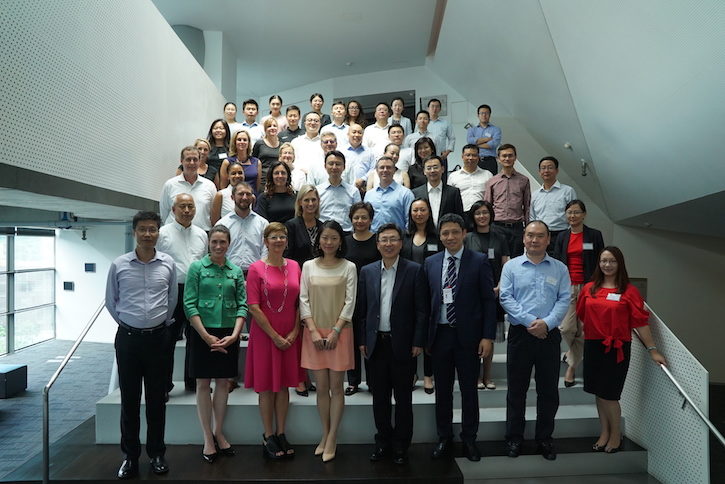
The Paulson Institute’s CEO Council for Sustainable Urbanization recently held its second working-level meeting to discuss collaborative projects that will help drive China’s move toward more sustainable cities and, ultimately, a low-carbon economy.
The CEO Council is a unique group of 18 U.S. and Chinese CEOs invited by Institute Chairman Hank Paulson to come together in late 2014 to collaborate on projects that could become national models for sustainable economic growth. Its members include CEOs of some of China’s top state-owned enterprises, including State Grid, China State Construction, and China Development, and top private companies from Alibaba to Fosun and Taikang Insurance, as well as leading U.S. companies, from GM to IBM, WalMart, Honeywell, Apple, and Dow.
The meeting, facilitated by project consultant KPMG, was attended by some 50 executives from all 18 companies, who traveled from across China and the United States to Shenzhen. Participants focused on energy-efficient buildings, green supply chains, factory efficiency, and communications strategies to raise awareness of sustainability among the Chinese public. At Vanke’s super-green headquarters, a LEED Platinum building designed by Steven Holl, executives from CSCEC and China Development Bank, both huge state-owned enterprises, presented plans for new energy-efficient, human-centric urban communities. CSCEC offered up several upcoming “future city” projects for potential collaboration.
The key will be ensuring that future collaborative CEO Council projects are truly sustainable. At the meeting, Paulson Institute Managing Director Kevin Mo presented principles for sustainable buildings, stressing the importance of definitions and metrics to determine how green a building really is. China Development Bank presented 18 “green and smart” guidelines, developed together with Energy Foundation China, to promote better cities from the environmental, economic, social, and cultural perspectives.
The meeting also included working-group discussions on sourcing sustainable forestry products (led by Apple and developer Vanke), a renewable energy initiative to explore electric vehicle charging (led by Chinese utility company State Grid, auto parts manufacturer Wanxiang, and General Motors), a possible factory efficiency initiative (led by WalMart, which has developed a comprehensive factory sustainability tool), and a potential communications initiative aimed at raising awareness of sustainability.
The Council’s goal is a big one—for U.S. and Chinese businesses, working together with government and NGOs, to help lead the way in developing innovative solutions for China’s sustainability challenges. What separates this council from others is that it is action-oriented. So the attendees bridged language and cultural differences, from state-owned to private-owned, American to Chinese, to brainstorm about constructive ways to work together. After the meeting, attendees noted the many opportunities that emerged from discussions with such unlikely partners. Armed with best practices, green technologies, and the right government policies, its members hope to help clean up the environment, one deal at a time.



